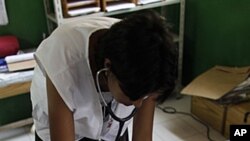Health agencies are marking this year's World Pneumonia Day by touting the advancements made in the prevention and treatment of pneumonia, the biggest killer of children under age five.
Pneumonia is the leading cause of death in children worldwide. The World Health Organization reports a child dies of pneumonia every 20 seconds and 98 percent of these deaths are in developing countries.
In total, WHO estimates nearly 1.5 million children under age five die every year from this killer disease. That is more than AIDS, malaria and tuberculosis combined. Studies show that prevention and proper treatment of pneumonia could avert one million deaths in children every year.
The GAVI Alliance says life-saving vaccines against pneumonia, which previously had been available mainly in rich nations, now are being introduced in developing countries. GAVI spokesman, Jeffrey Rowland calls this a tremendous achievement. He notes last year, nearly no poor child in the developing world was protected against pneumonia.
"Thanks to the global rollout of pneumococcal vaccines-pneumococcal being a bacterium that is the largest cause of pneumonia, 3.6 million children have been immunized against pneumonia. By this time next year, the number is expected to rise to nearly 13.6 million," said Rowland. "This number is a number to celebrate and celebrate loudly because it was not in existence a year ago."
Pneumococcal vaccines have been around in the United States since 2007. But, their prohibitive cost has made them inaccessible for people in poor countries. Three doses are needed to protect a child against pneumonia. Each dose costs between $85 and $110.
Rowland says through a series of complex negotiations, pharmaceutical companies have agreed to lower their prices to $3.50 per dose for developing countries. He says the new vaccines are expected to prevent more than 70 percent of serious pneumococcal infections among children in Africa and Asia, where children have the highest risk of this disease.
But vaccines are only half the story. Children who get sick with pneumonia have to be treated with antibiotics. Unfortunately, many children in poor countries are not able to reach the health facilities that can offer them lifesaving treatment.
The results of a World Health Organization (WHO) study in Pakistan find most children with pneumonia, can be successfully treated at home.
WHO spokeswoman Olivia Lawe-Davies says these findings offer great hope.
"The results of that study have shown that in fact, you get just as good results, in fact even slightly better results with treating children at home with the oral antibiotic, rather than referring them, possibly because, a lot of times, when children are referred in poor, isolated communities, they never actually make it to the facility," Lawe-Davies noted. "Or, when they get to the facility, they might not get the treatment that they are supposed to get. So, we found that the results of the outcomes of the at-home treated children were, in fact, slightly better."
Currently, WHO recommends that children with non-severe pneumonia be treated at home. This recent study, it notes, indicates that children with severe forms of pneumonia also could benefit from home treatment.
Lawe-Davies says WHO plans to conduct similar studies in other places. If the results indicate that children with severe pneumonia can be effectively managed at home, she says this would make treatment more accessible and cut costs. And, it would save more lives.




